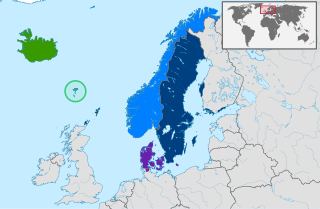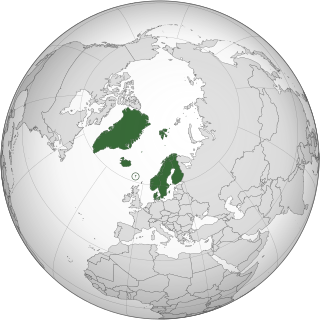
Scandinavia is a subregion of Northern Europe, with strong historical, cultural, and linguistic ties between its constituent peoples. Scandinavia most commonly refers to Denmark, Norway, and Sweden. It can sometimes also refer to the Scandinavian Peninsula. In English usage, Scandinavia is sometimes used as a synonym for Nordic countries. Iceland and the Faroe Islands are sometimes included in Scandinavia for their ethnolinguistic relations with Sweden, Norway and Denmark. While Finland differs from other Nordic countries in this respect, some authors call it Scandinavian due to its economic and cultural similarities.

The Nordic Council is the official body for formal inter-parliamentary Nordic cooperation among the Nordic countries. Formed in 1952, it has 87 representatives from Denmark, Finland, Iceland, Norway, and Sweden as well as from the autonomous areas of the Faroe Islands, Greenland, and Åland. The representatives are members of parliament in their respective countries or areas and are elected by those parliaments. The Council holds ordinary sessions each year in October/November and usually one extra session per year with a specific theme. The council's official languages are Danish, Finnish, Icelandic, Norwegian, and Swedish, though it uses only the mutually intelligible Scandinavian languages—Danish, Norwegian, and Swedish—as its working languages. These three comprise the first language of around 80% of the region's population and are learned as a second or foreign language by the remaining 20%.

The North Germanic languages make up one of the three branches of the Germanic languages—a sub-family of the Indo-European languages—along with the West Germanic languages and the extinct East Germanic languages. The language group is also referred to as the Nordic languages, a direct translation of the most common term used among Danish, Faroese, Icelandic, Norwegian, and Swedish scholars and people.

The northern region of Europe has several definitions. A restrictive definition may describe northern Europe as being roughly north of the southern coast of the Baltic Sea, which is about 54°N, or may be based on other geographical factors such as climate and ecology.
Nordic folk music includes a number of traditions of Nordic countries, especially Scandinavian. The Nordic countries are Iceland, Norway, Sweden, Denmark and Finland.

The Cooperation Committee of the Nordic Workers' Movement, better known by its abbreviation SAMAK, is a social democratic European political alliance gathering parties and labour councils in Nordic countries.
The Nordic Council Literature Prize is awarded for a work of literature written in one of the languages of the Nordic countries, that meets "high literary and artistic standards". Established in 1962, the prize is awarded every year, and is worth 350,000 Danish kroner (2008). Eligible works are typically novels, plays, collections of poetry, short stories or essays, or other works that were published for the first time during the last four years, or in the case of works written in Danish, Norwegian, or Swedish, within the last two years. The prize is one of the most prestigious awards that Nordic authors can win.
The administrative divisions of the Nordic countries are similar given the countries' shared culture and history.

The Nordic Council Music Prize is awarded annually by NOMUS, the Nordic Music Committee. Every two years it is awarded for a work by a living composer. In the intervening years it is awarded to a performing musician or ensemble.
Scandinavian literature or Nordic literature is the literature in the languages of the Nordic countries of Northern Europe. The Nordic countries include Denmark, Finland, Iceland, Norway, Sweden, and Scandinavia's associated autonomous territories. The majority of these nations and regions use North Germanic languages. Although the majority of Finns speak a Uralic language, Finnish history and literature are clearly interrelated with those of both Sweden and Norway who have shared control of various areas and who have substantial Sami populations/influences.

The Faroe or Faeroe Islands, or simply the Faroes, are an archipelago in the North Atlantic Ocean and an autonomous territory of the Kingdom of Denmark. The official language of the country is Faroese, which is closely related to and partially mutually intelligible with Icelandic.

Foreningen Norden, Föreningen Norden (Swedish), Norræna félagið (Icelandic), Norrøna Felagið (Faroese), Peqatigiiffik Nunat Avannarliit (Greenlandic) and Pohjola-Norden (Finnish), The Norden Associations, sometimes referred to as The Nordic Associations are non-governmental organisations in the Nordic countries promoting civil cooperation between the Nordic countries. Established since 1919, there are Norden Associations in Sweden, Norway, Denmark, Finland, Iceland, Greenland, the Faroe Islands and Åland. Since 1965 these national branches are grouped in an umbrella organisation Foreningene Nordens Forbund (FNF), The Confederation of Norden Associations. The co-operation between the Nordic countries include projects such as Nordjobb, Nordic Library Week and Norden at the Cinema.

The Nordic countries are a geographical and cultural region in Northern Europe and the North Atlantic. It includes the sovereign states of Denmark, Finland, Iceland, Norway and Sweden; the autonomous territories of the Faroe Islands and Greenland; and the autonomous region of Åland.
Valhalla is the Nordic Council of Ministers’ portal for children and youth culture in Denmark, Finland, Faroe Islands, Greenland, Iceland, Norway, Sweden and Åland. The portal features current developments taking place in architecture and design, visual art, dance and theatre, multicultural issues, film and media, research and education, games and physical exercise, literature and music in the Nordic region.
Rakel Helmsdal is a Faroese author and artist. She writes novels, short stories, plays, poems for all age groups, as well as being a visual artist who illustrates some her books. She is the current chair person for the Association of Writers of the Faroe Islands.
West Nordic Council's Children and Youth Literature Prize is a literary award, which was established in 2002 by the West Nordic Council. The prize is awarded every second year at the annual meeting of the West Nordic Council, normally in August. The three countries of the North West region of Northern Europe are Greenland, Iceland and the Faroe Islands. These countries nominate one literary work each. The winner gets a reward of DKK 60 000 and his or her book is translated into the other two languages of the region and into one of the Scandinavian languages: Norwegian, Danish, Swedish or Finnish, without any expenses for the winner.
The Nordic Council Environment Prize is awarded each year to a Nordic company, organization, or individual to recognize "exemplary efforts to integrate respect for the environment into their business or work or for some other form of extraordinary initiative on behalf of the environment". The nominees and winner are chosen by a 13-person committee consisting of two representatives each from Denmark, Norway, Sweden, Finland, and Iceland, as well as one each from the Faroe Islands, Greenland, and Åland. The first prize was awarded in 1995. Since 2005, the committee has chosen a theme each year for the nominations and award.










